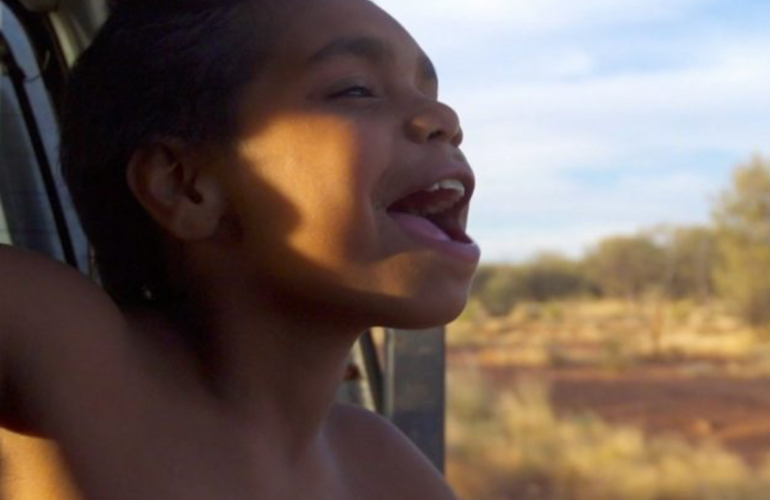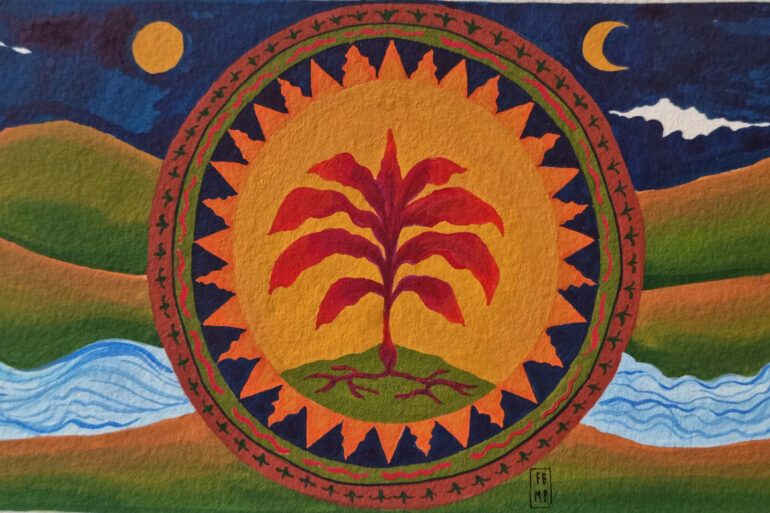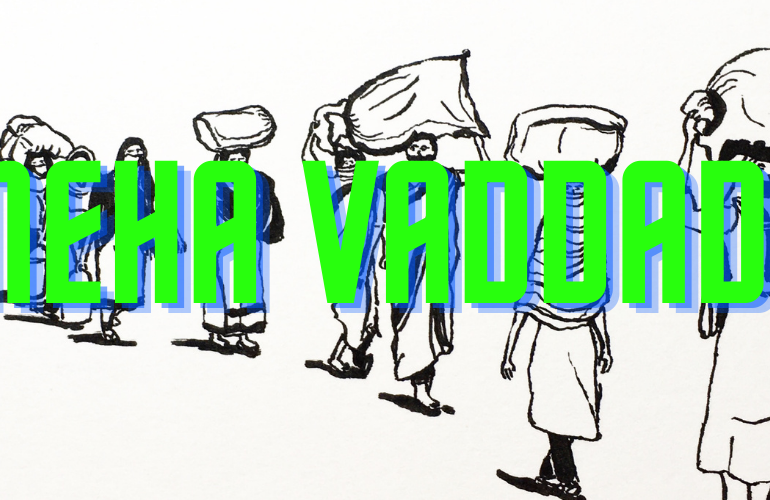As Ryan Calais Cameron’s For Black Boys Who Have Considered Suicide When the Hue Gets Too Heavy (FBB) returned for another run, I eagerly anticipated the opportunity to finally catch the show. Having missed its previous iterations while I was in Lagos, the buzz surrounding its return only heightened my curiosity. After a long day at the university, I went to the Garrick Theatre, eager to immerse myself in this production I had heard so much about.
Using a group therapy format, FBB delves into the experiences of six Black boys, navigating themes from beauty standards to the pervasive nature of police and policing. It confronts the cruel optimism of Black people participating in structures that have historically oppressed us, along with the complexities of how Black history is narrated. The themes also span from prostate cancer to romance and love, drawing from various ways Black boys and men exist in the world.
Drawing inspiration from Ntozake Shange’s For Colored Girls Who Have Considered Suicide / When the Rainbow Is Enuf, FBB stands on the shoulders of a ground-breaking choreopoem. Through various poems, Shange’s masterpiece eloquently dissects African American women’s lives, trials, and triumphs. The characters explore love, trauma, empowerment, resilience, and self-discovery. It is an acclaimed exploration of womanhood, grappling with the harsh realities of racism, sexism, domestic abuse, and the quest for self-identity.
Did I like the play or not?
The stage design of FBB is impressive, and the cast delivers performances that are nothing short of phenomenal. What’s more, they can sing and dance remarkably.
This play takes us on a rollercoaster of emotions. It had me in stitches with laughter, and I’m sure I would’ve shed a tear or two if I were much of a crier because there were moments that sent shivers down my spine with their raw emotional impact. The play had a great sense of pacing, knowing precisely when to pause and let the gravity of a moment sink in and when to crank up the energy and excite the audience.
As the play ended, I grappled with an affective response I couldn’t quite express.
In conversations with people about the play, particularly Black men, even queer ones, there is a resounding chorus of praise. For those that haven’t seen it yet, it’s praise for its existence. Those who have seen it expressed how deeply they connected with it, finding themselves reflected in its narrative. Despite its heavy themes, they viewed the experience as overwhelmingly positive, even cathartic.
So, when I did not align with this widespread sentiment, I couldn’t help but question my thoughts. Objectively, I appreciated the play’s production value, stellar acting, adept direction, and creative dialogue.
Yet, I felt uncomfortable surrounded by nods of agreement and smiles from fellow Black men who found solace and resonance in the production. Why did their enthusiastic endorsement leave me feeling like a fraud?
In previous interviews, Ryan mentions how the audience “almost become the seventh member” in the group therapy dynamic of FBB. However, the prospect of being the seventh member of this therapeutic ensemble leaves me unsettled. I feel like I am being invited to a therapy session that I have outgrown, and where some of the underlying issues for me are present in the room but are blatantly ignored or lazily engaged with, preventing any meaningful resolution.
Usually, I like to speak to creators of projects before giving reviews because their perspectives often sheds light to nuances I could have missed, and provide contexts for decisions made. I would have liked to discuss my discomfort with Ryan himself, but unfortunately, our schedules could not align.
However, as Ryan mentions in his interview with The Guardian, “Black men are conditioned not to articulate our emotions.” So, here I am, trying to articulate the feelings of discomfort this play triggered in me.
The complexity of Black masculinity
As an academic researching spaces marked by Blackness and masculinity, I know how my positioning could have influenced how I see and analyse this play. Perhaps it isn’t for me because I have outgrown this brand of presenting Black masculinity, and many may say I am reading too much into it.
That being said, I believe my affective response and discomfort to this play aligns more with the fact that I think there are far more complex ways Black boys navigate the world that are not reflected here. These discussions are not confined to academic spaces.
As a play drawing heavily from the exploration of Black women’s lives and their intricacies with socio-political systems through For Colored Girls, FBB falls short. It seemed like a missed opportunity to not engage with the nuances of how Black men can cause harm and discomfort even without knowing or realising it, and beyond physical acts of violence against each other through stabbings and knife crimes.
Violence among Black men goes beyond that and is far more nuanced, particularly when discussions of patriarchy and cis-heteronormativity comes into it. Many queer Black boys, including myself, have an understanding of this violence that we can experience at the hands of fellow Black boys. I have written about this when I discussed Black boyhood with Ben Hurst. Where are the Black boys who feel uncomfortable by the other Black boys in the room, and where is the room for that conversation in the play?
Black boys navigate a context shaped by power dynamics rooted in complex systems, such as cis-heteronormativity and patriarchy. Despite our existence within these intricate systems, it’s vital to acknowledge that Black boys aren’t merely always passive subjects; rather, we can unknowingly contribute to and perpetuate these structures. This adds layers of complexity to interactions among Black boys, as our ability to navigate these systems and negotiate ourselves within them influences our relationships and experiences.
In name only
Of course, For Colored Girls has had its share of critiques, particularly for its depiction of Black men. Some argue that Shange’s depiction of men as predominantly abusive or oppressive may perpetuate negative stereotypes and fail to represent the full spectrum of Black masculinity. People have thought it does not provide an analysis of why men can and do perpetuate violence against women.
Additionally, some critics have pointed out that the focus on trauma and suffering in the lives of the women, while important and powerful, may risk reducing Black women into positions of victimhood without acknowledging their agency.
I don’t believe these critiques are baseless. Critiques of a play often serve as the catalyst for deeper exploration and innovation. Therefore, a play inspired by For Colored Girls must actively engage with the discourse surrounding it, drawing inspiration and insight from the discourse within and outside of the play.
Subscribe to shado's weekly newsletter
Exclusive event news, job and creative opportunities, first access to tickets and – just in case you missed them – our picks of the week, from inside shado and out.

Ryan believes that FBB’s title was the source of its success and resonance for the Black British audience. And I must admit, there’s truth to this. The title, bold and evocative, echoes the power of For Colored Girls. However, it appears that the engagement with For Colored Girls stops at its title and format, as FBB fails to substantively grapple with the themes and issues central to its source material.
Ryan seemingly attempts to emulate Shange’s groundbreaking work in the context of Black boys. If his intention was indeed to pursue this path, I believe he should have approached it without invoking the legacy of For Colored Girls, which carries its own intricate history that can simply not be avoided.
Given the extensive marketing surrounding the play’s inspiration from For Colored Girls, it’s not unreasonable for audiences to expect a deeper engagement with the themes of the original work. This is especially true for those who have already connected and resonated with For Colored Girls.
Black boys as perpetual victims
FBB spotlights systemic biases that cast Black boys as perpetual threats. It sparks crucial conversations about the impact of policing on marginalised communities. However, it does this by primarily centering things happening to the Black boys. The play sidelines the boys’ agency in shaping their world in moments where they have that agency and power. It perpetuates the tired stereotype of Black men as inherently passive and powerless all the time, perpetually victimised and devoid of love.
It’s as if FBB echoes the criticisms levied against For Colored Girls, but with its focus on Black boys, the criticisms ring particularly true here because it fails to acknowledge the characterisation of men in the source material and has a flat depiction of men’s violence.
The characters in the play say: “Black boys were made to give more love than we could ever receive.” This perspective falls short, intentionally or not, of addressing the intricate intersections of race, gender, and power dynamics.
By solely attributing the challenges faced by Black boys to a ‘lack of love’, we overlook Black boys’ entanglement within cis-heteropatriarchal structures without a genuine exploration of our experiences and struggles. We are placed in positions of perpetual victimhood.
A starting point for Black masculinity
I believe the play marks the beginning of a dialogue on the intricacies of Blackness, and prompts us to delve deeper into the complexities. Perhaps this is why FBB would resonate, especially with those starting to grasp the nuances of Black masculinity. After attending the play, I ran into an acquaintance who had brought along their 16-year-old nephew. Their nephew expressed feeling seen and transformed by the play and how it spoke directly to him. This is great, and perhaps where this play shines.
This play serves as the starting point for many conversations and a call to action; it is not necessarily a piece of work that should reflect each person’s worldview. So, I am happy to concede that it does not reflect my worldview of Black masculinity. Afterall, I do not expect this one piece of art to reflect the multiplicities of Black boys’ experiences in its short runtime because Black boys are not a homogenous group.
Therefore, I have decided to witness these Black boys, including Ryan, where they are and not where I would wish them to be based on how I see them. This would require an authentic portrayal of the boys and how they exist in the world.
So, a good faith engagement with this play is that it elicits authentic affective responses because it reflects the authentic realities of how some (especially cis-heterosexual) Black men exist and see the world – from a perspective that inherently sees themselves as perpetual victims and lacking love.
For people who have either grown past this logic or who have experienced Black men in spaces where they can and do exert power, this narrative will undoubtedly cause some discomfort. This is often because we do realise when and how Black men can and do have power, and how Black men can and do use that power against other members of the community, whether they realise it or not.
The way I see it, my affective response to this play is an authentic response if I were invited to such a group therapy session in real life. While I would hate to be there, I may need to as a form of transformation, granted there are opportunities to respond and room for said transformation. This article can hopefully be received as a response.
I urge more people to experience this play and truly witness the Black boys depicted within. Let their stories provoke thought and introspection, and reflect on how you might exist in the world in relation to them. When you leave the theatre, confront the truths they’ve unveiled and continue the dialogue.
What can you do?
- Read A Thematic Exploration of “For Colored Girls Who Have Considered Suicide/ When the Rainbow is Enuf,” by Ntozake Shange by Jocelyn M. Richard
- Read my interview with Ben Hurst, Boys 2 Men: Preserving the essence of boyhood
- Watch Her Pen is a Machete: The Art of Ntozake Shange
- Watch For Colored Girls – Literary Analysis of Themes















